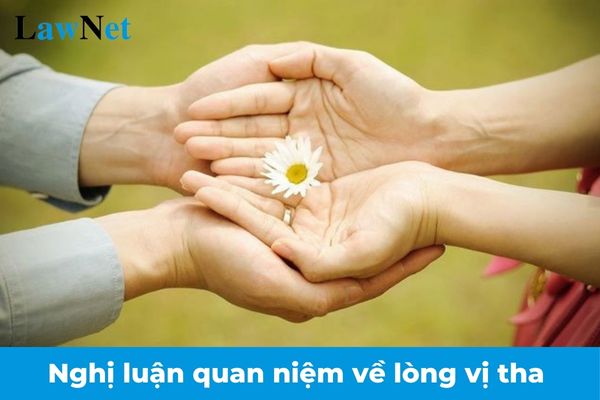What are the sample argumentative essays on the concept of altruism for 10th-grade students in Vietnam? What are the regulations on assessment via scores for 10th-grade students in Vietnam?
What are the sample argumentative essays on the concept of altruism for 10th-grade students in Vietnam?
Altruism is one of the noble qualities, expressed through tolerance, readiness to forgive, and sympathy for others' mistakes or difficulties.
Students can refer to the following sample argumentative essays on the concept of altruism:
Sample 1:
| Someone once said: “Conflict is the severe ailment of humanity, and altruism is the only remedy.” Indeed, altruism is a quality that humans need in life. Altruism means living for others, not being selfish, not living for oneself, not seeking personal gain. Altruism is sacrificing something for someone else (e.g., sacrificing time, money, wealth) without expecting to be acknowledged or reciprocated or to benefit directly or indirectly from the recipient or community. Altruism is the highest expression of human benevolence. It requires nothing more than a heart that can share joy and sorrow, that can love fellow beings. An altruistic person is someone who always aims to work for others, for society. Even if they think of themselves, they always strive to align it with the collective interest. In work, they take on difficulties, are not lazy, evade tasks, or push work onto others. When encountering hardships, they bear the responsibility. When facing failure, they do not blame others but seriously reflect on their own mistakes. Upon success, they do not boast or recount achievements. Altruistic people always live harmoniously, joyfully, and amiably with everyone. They empathize quickly, share, and are ready to help others. They also know how to restrain their emotions to please others. They even think of others before thinking of themselves (worry about the public's concern before their own, rejoice after the public rejoices). However, it is important to understand that living altruistically does not mean indulging in bad habits or excusing and condoning faults. Living altruistically requires personal courage, always having personal opinions, not being dependent on others. We need to criticize the selfish way of living that only thinks about oneself, indifferent and apathetic to others' pain. Selfishness causes division and weakens collective strength and unity. Altruism dwells within us, but to understand and practice it may take a lifetime. Therefore, from now on, with the smallest actions, express and nurture altruism. Don’t let it disappear one day, making you insensitive, with a heart turned to stone; then you won’t feel how beautiful this life is. The root of every virtue is altruism. Everything meaningful in life is what we offer to others. Life should not close the door to your soul but always keep it open. Let the world be part of you, and you be an important part of the world. Learn to forgive those who have hurt you and, in turn, do not hurt others. Not forgiving others’ mistakes is losing the opportunity to improve yourself. Truly, the light of altruism can spread to the darkest places, soothing every heart. Each individual should know how to live with altruism to feel happier and more joyful. |
Sample 2:
|
In life, we easily encounter errors or insignificant shortcomings. Faced with these defects, people easily become angry and criticize, forgetting the choice to live altruistically - one of the virtues we need. "The red-covered mirror pedestal Those in the same country should love one another." Grasping this teaching deeply, we know how to promptly give love, originating from sincerity and voluntariness. We know how to live lovingly, caring and sharing, knowing how to give more. Thanks to altruism, each of us becomes more complete in character. Altruism makes life more peaceful and serene. The soul is no longer "tainted" by animosity and hatred but only holds benevolence and tolerance. Moreover, altruism can also redeem those around us, helping them find trust in themselves and life. From this, society and the community built on altruism will become more civilized and just. |
Note: The content is for reference only.

What are the sample argumentative essays on the concept of altruism for 10th-grade students in Vietnam? What are the regulations on assessment via scores for 10th-grade students in Vietnam? (Image from Internet)
What are the regulations on assessment via scores for 10th-grade students in Vietnam?
According to Clause 2, Article 5 of Circular 22/2021/TT-BGDDT, the assessment via scores for 10th-grade students in Vietnam is regulated as follows:
- Teachers shall use scores to assess training and learning results of students.
- Assessment conducted based on scores shall be used in regular assessment and periodic assessment via examination and assessment regarding implementation of training and learning tasks of students depending on subject’s characteristics.
How many assessment forms are used for 10th-grade students’ learning and training results in Vietnam?
According to Article 5 of Circular 22/2021/TT-BGDDT, 10th-grade students’ learning and training results in Vietnam are assessed through two forms, including:
- Assessment via feedback;
- Assessment via scores.

